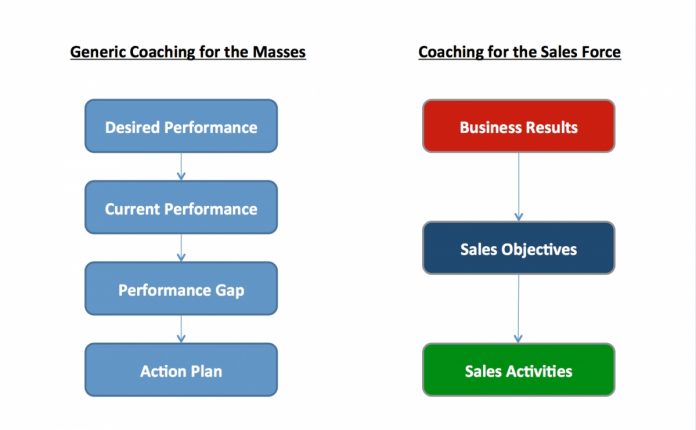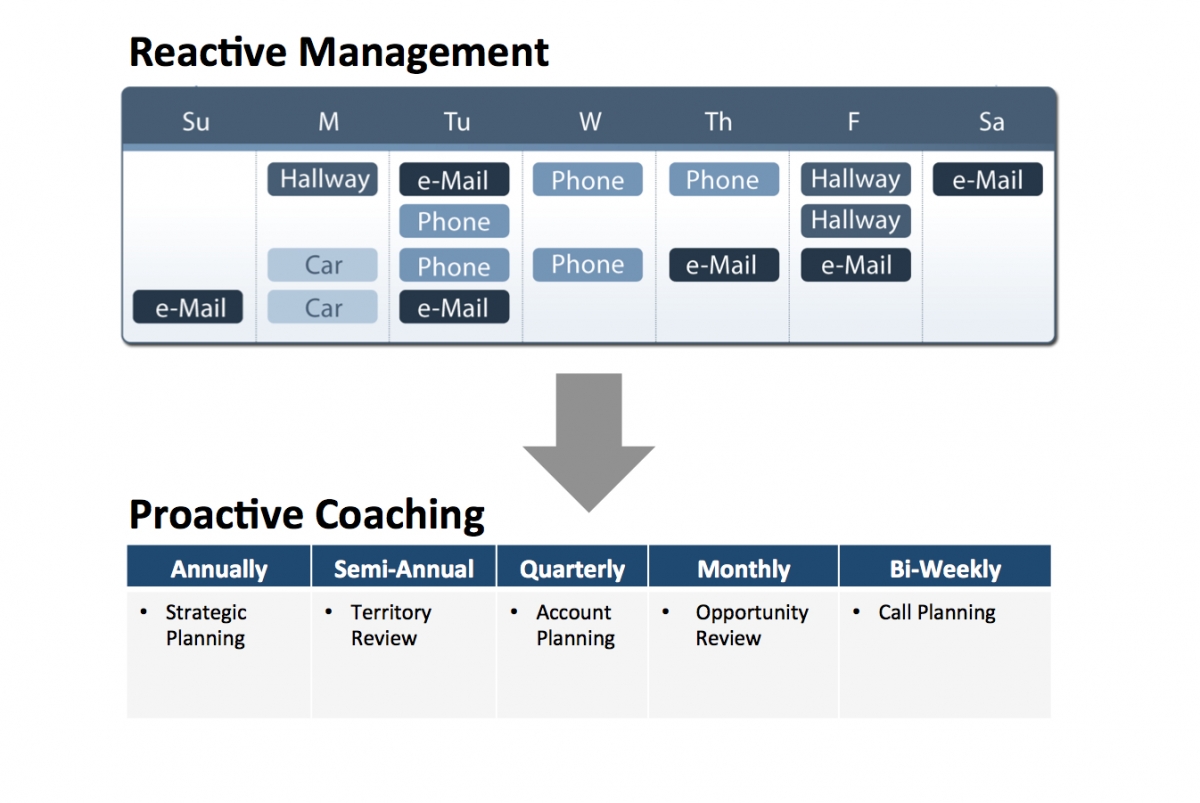
Training professionals, beware: The foundation for sales rep coaching is shifting, which means that the processes and procedures for training sales managers to coach also must change to stay relevant. Why are these shifts coming? The brutal reality is that traditional coaching models just aren’t providing a sufficient foundation for driving performance improvement of today’s complex salesforces.
Traditional coaching models typically are designed to help managers coach their direct reports to improve individual competencies. These traditional models have numerous names and acronyms, such as GROW, CIGAR, or GAINS, just to name a few. They all provide a similar path that looks something like this:
- Assess current performance.
- Identify gaps in performance.
- Develop plan to close gaps.
- Execute plan.
- Assess progress.
- Repeat.
Although these models are valuable for helping sales managers improve the performance of individual sellers, they are not enough by themselves to drive lasting change within a salesforce. In fact, numerous companies are spending dollar after dollar and year after year training and then retraining sales managers to coach using these models, yet these same organizations often find that the coaching isn’t effective or, even worse, that coaching isn’t happening at all. As a result, the field of sales is ripe for the following three shifts.
Shift 1: Generic to Sales-Specific

What does the typical coaching model used by sales managers have in common with the coaching models used by managers in other departments at various companies across disciplines? The answer is: Everything. But that is not necessarily a good thing. Sales managers are given the same traditional coaching models that any manager in any function within a company can use; however, generic coaching models aren’t sales-specific enough to help sales managers address the day-to-day intricacies of the salesforce. As the discipline of sales advances and becomes more refined, generic coaching models are no longer sufficient to equip salesforces to advance at the pace required, which is driving the shift from generic coaching models to the need for a more sales-specific coaching model.
Sales-specific coaching helps sales managers focus on the key components that have the biggest impact on sales team performance. Extensive research conducted and published by Vantage Point Performance in “Cracking the Sales Management Code,” reveals that there are three key components sales managers need to focus on for maximum salesforce effectiveness:
- Business results
- Sales objectives
- Sales activities
According to the research, targeted sales activities lead to the accomplishment of stated objectives, which ultimately leads to the attainment of desired business results, yet none of these components is addressed in generic coaching models. As sales managers realize the impact these three components have on salesforce performance, the demand for more sales-specific coaching will increase.
Shift 2: Individual to Business Needs
Coaching sales reps to improve individual competencies is a valuable investment, which should continue. However, there is a key element missing from traditional coaching models that focus solely on individual improvement—the overall needs of the business. As the field of sales advances and matures, it requires a more holistic view of how the development of the salesforce supports the overall needs and goals of the business.
Traditional coaching models are designed to address specific competency gaps in individual sales rep performance, but the competencies rarely are tied back to the overall needs of the business. This means that a significant investment is made in areas that do not create a direct path to achieving the organization’s overall goals. For instance, extensive time and resources might be invested in coaching a sales rep on how to have more effective conversations, but the “effectiveness” of the conversation doesn’t matter if the sales rep isn’t targeting prospects that will help the organization reach its business goals. As a result, a shift is taking place that moves organizations away from traditional coaching models that focus solely on sales reps’ individual competencies toward coaching that ties back to an organization’s overall desired business results. Sales managers and sellers still will need to focus on individual competencies, but the competencies must tie directly back to the organization’s overall business needs.
Shift 3: Ad Hoc to Structured

A day in the life of a sales manager tends to be hectic and ad hoc. Sales managers must respond to constant calls from sales reps, put out frequent fires, and submit an endless number of reports. In the midst of all of the chaos, sales managers are supposed to find time to coach sales reps. Unfortunately, effective sales coaching doesn’t just happen during everyday conversations or through sporadic meetings. Sales coaching must be intentional, planned, and scheduled. This means a shift is brewing toward a more structured environment for coaching.
In order for sales coaching to drive lasting change within an organization, a shift must be made from the ad hoc environment to a more structured framework. In other words, sales managers need a sales management rhythm to provide a framework for how and when coaching will take place within their daily schedules. A sales management rhythm can be defined as the formal and informal interactions sales managers engage in to achieve sales goals. It defines what interactions should take place, who should be included, how frequently the interactions should take place, as well as the duration and purpose of the interactions. A sales management rhythm helps to eliminate the unnecessary items, leaving behind only the action items that are executable and linked to desired outcomes.
Within a sales management rhythm, sales managers must have more structured, deliberate coaching conversations with sales reps. In order to squeeze in a little coaching, sales managers tend to “coach in the moment” whenever they have conversations with their sales reps, but coaching without a specific agenda means sales reps won’t make a distinction between coaching conversations and everyday ad hoc “information exchange” conversations. Without context, sales reps don’t know they are being coached, so a sales coaching conversation just becomes another conversation to them. When sales managers and sellers better prepare for the content, tone, and structure of a sales coaching conversation, by design, it will have more value.
Michelle Vazzana is a partner at Vantage Point Performance and co-author of “Cracking the Sales Management Code.” Vazzana has more than 28 years of sales and management experience in the major account environment. For more information, visit www.vantagepointperformance.com.




